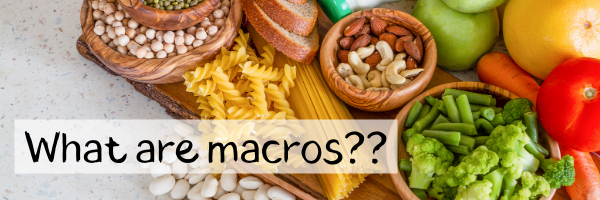Have you started a new fitness plan? Are you thinking of starting a new fitness plan in the future? Have you been following a fitness plan but you are not sure if you are eating adequately? If you answered yes to any of these questions, this post is for you! What you eat before and after a workout is very important for building muscle and making all that hard work at the gym worth it. This might take some planning, so let’s start with the basics!

Macros here, macros there, what are macros??
Have you noticed that many people keep talking about macros? The next thing you find yourself doing is searching “what are macros?” on Google. Let me give you the low-down on macros. Macros are short for macronutrients. There are 3 macronutrients: carbohydrates, fats, and protein. What does each macronutrient do and how can they help with muscle building? Here’s a breakdown:
Carbohydrates
Carbohydrates are the main source of energy (glucose) for the brain and muscles. Low blood glucose levels can leave you feeling tired and make your training or exercise feel harder (this is why it’s important to eat before a workout!). There are simple carbohydrates and complex carbohydrates. Fruits are a simple carbohydrate, they contain naturally-occurring sugars, which enter our bloodstream quickly providing our cells with quick “fuel” (excellent before a quick workout). An example of a complex carbohydrate would be whole-grain pasta or brown rice, which have starch and fibre. Your body takes longer to break them down, and slowly release sugar into the bloodstream.
Fats
These macronutrients are also called lipids, they play an important role in our cell membranes, protecting organs, and help create hormones that control our appetite. Fats come in different types, including monounsaturated, polyunsaturated, saturated, and trans-fat. Monounsaturated and polyunsaturated fats are good for our health; the polyunsaturated fats are the omega-3s and omega-6s. Saturated fats are the fats we should be limiting for the health of our hearts. Trans- fats are artificial fats present in many processed foods and baked goods (avoid these!). When you eat mainly monounsaturated and polyunsaturated fats, you are providing your body with important nutrients that aid with brain and heart health (very important to include them in an after workout meal).
Protein
Protein is made up of amino acids, which are our body’s building blocks. Protein is not only important for muscles, but is also important for cellular reactions, tissue building, and healthy hair. Why is protein the first macronutrient everyone talks about when they talk about muscle building? Because when we exercise, our muscles tear a little (this is good!) and our body uses protein to rebuild and grow the muscle (making them bigger!). When you don’t get enough protein, you may notice muscle loss, thin hair, weak nails, and you might even feel lethargic.

Eat 1-4 hours before you exercise. Eating before exercising helps to prevent fatigue, complete the workout, and maintain energy. Here are some tips to consider, but remember that with time as well as trial and error, you will find what best works for you:
- 1 hour before your exercise: choose a small snack, make sure you are not eating a full meal before a work out as this will require more time for your body to digest the food and you might feel sick during the exercise.
- 2-4 hours before your exercise: have a large snack, or even a meal if you are close to 4 hours. The aim is to eat enough to feel satisfied but not full by the time you start exercising, to prevent getting an upset stomach. Include complex carbohydrates, protein and healthy fats.
- Don’t eat foods high in fibre 1 hour before you exercise, as high fibre snacks before exercising can cause bloating and/or gas preventing you from exercising at your best.
Sample pre-exercise meals:
- 1 slice of whole-wheat toast with low-fat cheese
- Fruit and yogurt
- Medium fruit or ½ cup of berries or grapes
- Smoothie made with low-fat milk or yogurt and fruit

After a workout, we need to refuel and rebuild our muscles, the carbohydrates and protein from a meal will help with muscle protein synthesis (build muscle). The requirements for adults for each macronutrient are the following: 10-35% of total daily calories from protein, 20-35% daily calories from fat and 45-65% daily calories from carbohydrates. However, this can change based on the type of exercise you do.
- For weight lifting, you would want to have about 30-35% of calories from protein, 45-50% of calories from carbohydrate, and 30-35% of calories from healthy fat.
- For cardio, you want to focus more on carbohydrates than protein. You can do 50-55% of calories from carbohydrate, 25-30% protein, and the rest of the calories from healthy fat.
Sample post-exercise meals:
- Whole grain tortilla wrap with chicken or turkey with vegetables of your choice (you can add hummus instead of mayo).
- Baked sweet potato, grilled fish or chicken, cooked vegetables
- Black bean chilli with quinoa with whole grain bread (make sure to add as many vegetables as you like)
Examples of good protein choices:
- Beans, peas, lentils
- eggs
- Lean meats, fish, seafood, poultry
- Milk, yogurt, cheese and cottage cheese
- Nuts and seeds (and their butter)
- Soy products: tofu, fortified soy beverages
Important to Remember:
- Protein should be distributed throughout the day as it has been proven to increase muscle protein synthesis, instead of piling protein in one meal.
- Drink enough fluids before, during, and after your exercise.
Things get a little more complex if you are a competitive athlete…..
For competitive athletes, what you eat, how much you eat, and when you eat, depends on the person’s body type, goals, and the sport they compete in.

Thursday, October 31, 2019 in Nutrition Blog
Share: Twitter, Facebook



